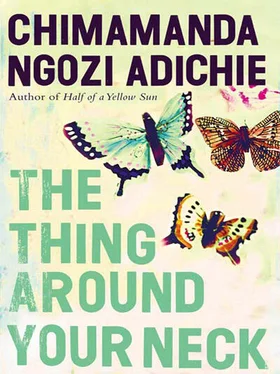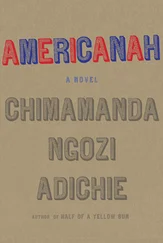After they ate the creamy chicken prettied with herbs, after they drank the sparkling water that came in glossy bottles, Edward stood up to give the welcoming address. He squinted as he spoke, and his thin hair fluttered in the breeze that smelled of the sea. He started by telling them what they already knew — that the workshop would be for two weeks; that it was his idea but of course funded graciously by the Chamberlain Arts Foundation, just as the Lipton African Writers’ Prize had been his idea and funded also by the good people at the foundation; that they were all expected to produce one story for possible publication in the Oratory; that laptops would be provided in the cabins; that they would write during the first week and review each participant’s work during the second week; and that the Ugandan would be workshop leader. Then he talked about himself, how African literature had been his cause for forty years, a lifelong passion that started at Oxford. He glanced often at the Ugandan. The Ugandan nodded eagerly to acknowledge each glance. Finally Edward introduced his wife, Isabel, although they had all met her. He told them she was an animal rights activist, an old Africa hand who had spent her teenage years in Botswana. He looked proud when she stood up, as if her tall and lean gracefulness made up for what he lacked in appearance. Her hair was a muted red, cut so that wisps framed her face. She patted it as she said, “Edward, really, an introduction.” Ujunwa imagined, though, that Isabel had wanted that introduction, that perhaps she had even reminded Edward of it, saying, Now, dear, remember to introduce me properly at lunch. Her tone would have been delicate.
The next day at breakfast, Isabel used just such a tone when she sat next to Ujunwa and said that surely, with that exquisite bone structure, Ujunwa had to come from Nigerian royal stock. The first thing that came to Ujunwa’s mind was to ask if Isabel ever needed royal blood to explain the good looks of friends back in London. She did not ask that but instead said — because she could not resist — that she was indeed a princess and came from an ancient lineage and that one of her forebears had captured a Portuguese trader in the seventeenth century and kept him, pampered and oiled, in a royal cage. She stopped to sip her cranberry juice and smile into her glass. Isabel said, brightly, that she could always spot royal blood and she hoped Ujunwa would support her antipoaching campaign and it was just horrible, horrible, how many endangered apes people were killing and they didn’t even eat them, never mind all that talk about bush meat, they just used the private parts for charms.
After breakfast, Ujunwa called her mother and told her about the resort and about Isabel and was pleased when her mother chuckled. She hung up and sat in front of her laptop and thought about how long it had been since her mother had really laughed. She sat there for a long time, moving the mouse from side to side, trying to decide whether to name her character something common, like Chioma, or something exotic, like Ibari.
Chioma lives with her mother in Lagos. She has a degree in economics from Nsukka, has recently finished her National Youth Service, and every Thursday she buys The Guardian and scours the employment section and sends out her CV in brown manila envelopes. She hears nothing for weeks. Finally she gets a phone call inviting her to an interview. After the first few questions, the man says he will hire her and then walks across and stands behind her and reaches over her shoulders to squeeze her breasts. She hisses, “Stupid man! You cannot respect yourself!” and leaves. Weeks of silence follow. She helps out at her mother’s boutique. She sends out more envelopes. At the next interview, the woman, speaking in the fakest, silliest accent Chioma has ever heard, tells her she wants somebody foreign-educated, and Chioma almost laughs as she leaves. More weeks of silence. Chioma has not seen her father in months, but she decides to go to his new office in Victoria Island to ask if he can help her find a job. Their meeting is tense. “Why have you not come since, eh?” he asks, pretending to be angry, because she knows it is easier for him to be angry, it is easier to be angry with people after you have hurt them. He makes some calls. He gives her a thin roll of two-hundred-naira notes. He does not ask about her mother. She notices that the Yellow Woman’s photo is on his desk. Her mother had described her well: “She is very fair, she looks mixed, and the thing is that she is not even pretty, she has a face like an overripe yellow pawpaw.”
The chandelier in the main dining room of Jumping Monkey Hill hung so low that Ujunwa could extend her hand and touch it. Edward sat at one end of the long, white-covered table, Isabel at the other, and the participants in between. The hardwood floors thumped noisily as waiters walked around and handed out menus. Ostrich medallions. Smoked salmon. Chicken in orange sauce. Edward urged everyone to eat the ostrich. It was simply mah -ve-lous. Ujunwa did not like the idea of eating an ostrich, did not even know that people ate ostriches, and when she said so, Edward laughed good-naturedly and said that of course ostrich was an African staple. Everyone else ordered the ostrich, and when Ujunwa’s chicken, too citrusy, came, she wondered if perhaps she should have had the ostrich. It looked like beef, anyway. She drank more alcohol than she had ever drunk in her life, two glasses of wine, and she felt mellowed and chatted with the Senegalese about the best ways to care for natural black hair: no silicone products, lots of shea butter, combing only when wet. She overheard snatches as Edward talked about wine: Chardonnay was horribly boring.
Afterwards, the participants gathered in the gazebo — except for the Ugandan, who sat away with Edward and Isabel. They slapped at flying insects and drank wine and laughed and teased one another: You Kenyans are too submissive! You Nigerians are too aggressive! You Tanzanians have no fashion sense! You Senegalese are too brainwashed by the French! They talked about the war in the Sudan, about the decline of the African Writers Series, about books and writers. They agreed that Dambudzo Marechera was astonishing, that Alan Paton was patronizing, that Isak Dinesen was unforgivable. The Kenyan put on a generic European accent and, between drags at his cigarette, recited what Isak Dinesen had said about all Kikuyu children becoming mentally retarded at the age of nine. They laughed. The Zimbabwean said Achebe was boring and did nothing with style, and the Kenyan said that was a sacrilege and snatched at the Zimbabwean’s wineglass, until she recanted, laughing, saying of course Achebe was sublime. The Senegalese said she nearly vomited when a professor at the Sorbonne told her that Conrad was really on her side, as if she could not decide for herself who was on her side. Ujunwa began to jump up and down, babbling nonsense to mimic Conrad’s Africans, feeling the sweet lightness of wine in her head. The Zimbabwean staggered and fell into the water fountain and climbed out spluttering, her dreadlocks wet, saying she had felt some fish wriggling around in there. The Kenyan said he would use that for his story — fish in the fancy resort fountain — since he really had no idea what he was going to write about. The Senegalese said her story was really her story, about how she mourned her girlfriend and how her grieving had emboldened her to come out to her parents although they now treated her being a lesbian as a mild joke and continued to speak of the families of suitable young men. The black South African looked alarmed when he heard “lesbian.” He got up and walked away. The Kenyan said the black South African reminded him of his father, who attended a Holy Spirit Revival church and didn’t speak to people on the street because they were not saved. The Zimbabwean, Tanzanian, white South African, and Senegalese all spoke about their fathers.
Читать дальше











